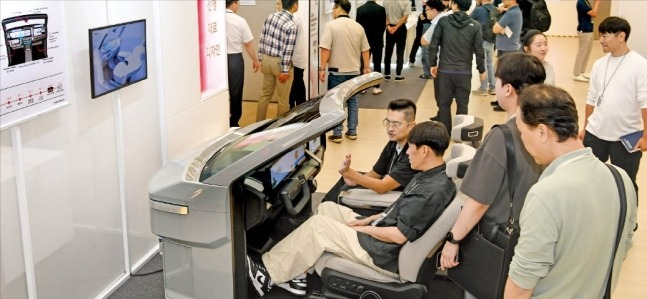UIWANG, Gyeonggi Province – Hyundai Mobis Co., the world’s fifth-largest auto parts maker, plans to mass-produce a component that doubles electric vehicle charging speed from the end of 2025, aiming to revive the sluggish global EV industry by solving the main issue for consumers reluctant to buy the clean cars.
The leading South Korean automaker Hyundai Motor Group unit on Wednesday unveiled an integrated charging control unit (ICCU), which boosts
EV charging speed to 22 kilowatts (kW) from the current 11 kW. The part allows users to use EV batteries to power or charge electronic devices.
Hyundai Mobis also showcased 65 new technologies, including 15 industry firsts, during its tech event at its research and development (R&D) center in Uiwang, one of the satellite cities surrounding Seoul.
“Researchers strive to develop advanced technologies here in the R&D center despite the EV chasm,” Lee Youngkook, head of Hyundai Mobis’ R&D division in the e-powertrain business unit, told reporters during the event, referring to the protracted EV uptake slowdown. “Hyundai Mobis’ competitiveness in electrification parts is recognized as the industry’s best by global customers.”
BEYOND ELECTRIC VEHICLESHyundai Mobis introduced strategies to develop core
electrification parts – electric powertrain systems, battery systems and power conversion systems –
as it focuses on electrification, expecting EVs to eventually become mainstream in the global automobile industry despite their recent slowing growth.
Hyundai Mobis generated 12 trillion won ($9 billion) in sales from its electrification business last year, about 20% of its total revenue.
The company aims to expand its electrification business into advanced air mobility (AAM) and robotics based on its know-how in auto parts. It has been working in the electrification sector since it developed battery systems, motors and inverters for hybrid electric vehicles in 2011.
Hyundai Mobis opened the research center last December to combine some 650 electrification researchers across the country, for various tasks such as battery system assembly (BSA) development and evaluation, battery management system (BSM) functional safety tests and electromagnetic tests on electrification parts.
“This is Hyundai Motor Group’s innovative hub for electrification development,” said a company official. The group is the world’s third-largest automaker, made up of two car manufacturers – Hyundai Motor Co. and Kia Corp.
The center developed an EV transformer, which does not need nickel. The part should help EV makers reduce reliance on China, the world’s seventh-largest nickel producer.
Write to Jung-Eun Shin at
newyearis@hankyung.com Jongwoo Cheon edited this article.



